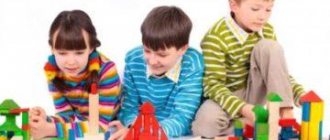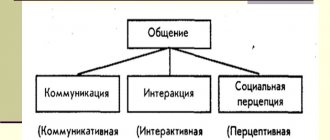Psychological correction: definition, goals and objectives
In the Psychotherapeutic Encyclopedia of Karvasarsky, psychological correction is defined as: “Directed psychological influence on certain psychological structures in order to ensure the full development and functioning of the individual”
According to Abramova, psychological correction involves an organized influence on the client in order to change the indicators of his activity and compliance with the age norm of mental development.
Also, “psychological correction is understood as a certain form of psychological and pedagogical activity to correct such features of mental development that, according to the system of criteria accepted in developmental psychology, do not correspond to the hypothetical “optimal” model of this development, the norm or, rather, the age guideline as an ideal option for the development of the child at one or another stage of ontogenesis.”
Thus, psychological correction is one of the types of psychological assistance (among others - psychological counseling, psychological training, psychotherapy); activities aimed at correcting characteristics of psychological development that do not correspond to the optimal model, using special means of psychological influence; and also - activities aimed at developing in a person the necessary psychological qualities to increase his socialization and adaptation to changing living conditions.
Monitoring the dynamics of the mental development of children studying and brought up in educational institutions allows timely resort to developmental correction in order to create optimal opportunities and conditions for raising weak and average students to the level of strong, most developed ones, as well as for the further development of students who exhibit special needs. capabilities.
When determining the goals and objectives of correction, it is necessary to proceed from an understanding of the unique role played by a given specific period of age development, to set a task that is adequate to the development potential at a given stage of ontogenesis, the value of a given age in the holistic progressive process of personality formation. Realizing the potential of each age stage of development is the main form of preventing the occurrence of deviations or deficiencies in development at subsequent age levels.
So, the main goal of correctional work in the space of a certain age is to promote the full mental and personal development of the individual.
The main task is the psychological and pedagogical correction of deviations in the mental development of the individual (intellectual, emotional, motivational, behavioral, volitional, motor, etc.) based on the creation of optimal psychological and pedagogical conditions for the development of the creative potential of the personality of each person.
Psychocorrection is planned and carried out by the psychologist himself. Depending on the form of organization of psychological correction, the following types are distinguished: individual, microgroup, group and mixed.
Individual psychocorrection involves working with a client one-on-one in the absence of strangers, in which case confidentiality, intimacy of relationships, and deeper and more effective work are ensured.
The microgroup form of correction involves working in groups of 2 people, usually with similar developmental problems.
Basic principles
Basic principles of psychocorrection:
- Normative development. Before prescribing methods of psychological correction, it is necessary to study the individual characteristics of the individual, social status, and level of development of the main activity.
- Unity of correction and diagnostics. The success of using psychocorrection depends on the depth and thoroughness of diagnostic procedures.
- Correction from top to bottom. For correctional activities to be effective, psychologists must create a “proximal comfort zone.”
- Operating principle. Correct corrective action provokes a person to be active and directs his energy in the necessary direction. This promotes positive changes in the psyche.
Basic principles of psychological and pedagogical correction
The basic principles of psychocorrectional work in our country are based on the fundamental principles developed in domestic psychology that personality is an integral psychological structure that is formed in the process of a person’s life on the basis of his assimilation of social forms of consciousness and behavior (B.G. Ananyev, L. I. Bozhovich, L. S. Vygotsky, P. Y. Galperin, V. V. Davydov, A. V. Zaporozhets, A. N. Leontiev, S. L. Rubinshtein, D. B. Elkonin, etc.). The mental development and formation of a child’s personality are possible only in communication with adults and occur primarily in the activity that is leading at this stage of ontogenesis (in preschool childhood - play, in primary school childhood - educational activity). In the presence of certain, strictly thought-out conditions, all healthy children have the ability to develop. Both the educator and the teacher have no reason to explain the failures of their pupils or pupils by their poor mental development, their lack of abilities, since the development of children itself is largely determined by training, education, communication, and depends on the characteristics of the organization of these processes.
The following can be named as the main conditions for development.
1. Maximum implementation of age-related capabilities and reserves in the work of the teaching staff with students, based on the sensitivity of a particular age period, the zone of proximal development, etc.
Thus, at primary school age, targeted education and upbringing of the child begins. The main type of his activity is educational activity, which plays an important role in the formation and development of all mental properties and qualities. It is this age that is sensitive for the development of such psychological formations as arbitrariness of mental processes, an internal plan of action, reflection on the ways of one’s behavior, the need for active mental activity or a tendency to cognitive activity, and the mastery of educational skills. In other words, by the end of primary school age, a child should be able to learn, want to learn, believe in his abilities and have positive feelings towards school and learning (in any case, school should not cause him disgust and fear).
The best basis for successful learning and development of a child is the harmonious correspondence of educational and intellectual skills and abilities to such personality parameters as self-esteem, cognitive and educational motivation. This correspondence is laid precisely at primary school age. Almost all problems (including underachievement, academic overload, etc.) that arise at subsequent stages of education are explained by the fact that the child either does not know how to study, or learning is not interesting to him, and his prospects are not visible.
2. Development in the educational process of individual characteristics of students within each age period - interests, inclinations, self-awareness (self-esteem, sexual identity, etc.), orientation, value orientations, life plans, etc.
The problem of individual differences is very complex. It is difficult to name at least one property, trait, or quality of a person that would not be included in the scope of this problem. It is known that children in the same class are very different from each other, and this is wonderful. The sameness of children should worry and alert the teacher: something is wrong here.
However, the central point in a person’s individual characteristics is his abilities.
There is a huge variety of activities, each of which requires certain abilities for its implementation at a sufficiently high level. The formation of abilities has its own characteristics at each age stage and is closely related to the development of the child’s interests, self-assessment of his successes and failures in a particular activity. The mental and personal development of a child is impossible without the development of his abilities. The development of abilities and personality development are interdependent processes. There are no children who are incapable of anything. All children are capable of learning, every healthy child is able to receive a general secondary education and master the material of the school curriculum. However, each child has his own path to developing abilities.
The formation and development of abilities requires patience on the part of adults, attention and careful attitude towards the slightest successes of the child. This is exactly what adults often lack! And they soothe their conscience with the common formula that abilities are the exception, not the rule. But if education does not develop the child’s abilities, it is not education, it is some kind of organized pastime.
3. Creation at school of a psychological climate favorable for the development of children, which is determined primarily by productive communication, interaction between the child and teachers, the child and peers.
Meaningful communication is less oriented toward any kind of evaluation or evaluative situations; It is characterized by non-judgment. The highest value in communication is the other person with whom we communicate, a person of any age (even small), with all his qualities, properties, moods, etc. The main thing in communication is respect for the right of another person (child, adult) to his individuality , already established or just emerging.
A. Adler's concept
Classical psychotherapy, based on the views of S. Freud, is not always the only option. A. Adler founded his own theory of psychocorrection . He considered man to be a holistic being who strives to develop, independently determining his priorities. This largely predetermined the humanistic direction of correction.
Adler considered external influence on personality to be less significant than subjective perception. He believed that the main attention in psychology should be paid not to interpersonal, but to the internal problems of the client. Although the social role of a person is important. According to Adler, a person is not self-sufficient, he must interact with other people, help them, and be a member of society.
Requirements for correctional and developmental programs
Requirements for programs are determined by the basic principles of psychological and pedagogical correction: the unity of correction and development, the unity of age-related and individual development, the unity of diagnostics and development correction, the activity principle of correction, the approach to each child as gifted. The unity of correction and development determined the name of the programs as correctional and developmental.
The correctional and developmental program is developed and implemented in the joint activities of a child (school) psychologist and an educator (educator, teacher). A psychologist, based on a psychological examination of children (psychodiagnostics) or a psychological analysis of any pedagogical situation, formulates recommendations. These recommendations are implemented in work with children by teachers and parents in interaction with a psychologist and with the active role of the child himself.
Recommendations for correcting a child’s mental development are effective only when they are given in the context of understanding the whole personality, in the totality of all its qualities and properties. S.L. Rubinstein included in the holistic personality structure:
· orientation (needs, motives, goals, interests, ideals, beliefs, worldview, attitudes);
· abilities (general, special, giftedness, talent);
· character (attitude towards oneself, towards people, towards the world, volitional qualities).
It is necessary to keep in mind that the core of a personality is its motivational sphere. The structure and nature of any mental qualities largely depend on the orientation of a person’s personality, on their connection with his other properties and on the function that these properties perform in the general system of human behavior. The child’s personality structure is just being formed, its components develop unevenly, correctional programs are designed to create conditions for the balanced development of individual structural components of the personality as an integrity.
At the same time, work can be done both with the child himself to correct his individual psychological formations, and with the living conditions, upbringing and education in which the child finds himself.
Correctional work should be structured not as a simple training of skills and abilities, not as individual exercises to improve psychological activity, but as a holistic, meaningful activity of the child, organically fitting into the system of his daily life relationships. In preschool age, a universal form of correction is play. Play activities can be successfully used both to correct a child’s personality and to develop his cognitive processes, speech, communication, and behavior. At school age, this form of correction is a specially organized educational activity, for example, using the method of gradual formation of mental actions. Both in preschool and primary school age, such correctional and developmental programs are effective that include children in a variety of creative activities - visual, gaming, literary, labor, etc.
It is very important that developmental correction be proactive and anticipatory in nature. She should strive not to exercise and improve what already exists, what has already been achieved by the child, but to actively form what should be achieved by the child in the near future in accordance with the laws and requirements of age-related development and the formation of personal individuality. In other words, when developing a strategy for correctional work, one cannot limit oneself to immediate developmental needs, but must take into account and focus on the development perspective. The value of a correctional development program is that it allows the child to feel promising in activities that are personally significant to him.
When developing correctional and developmental programs, it should be understood that each kindergarten, school, boarding school, orphanage, any educational children's institution has its own characteristics, which, one way or another, influence the development of the child. Therefore, the specifics of specific tasks and forms of correctional work depend on the type of child care institution.











